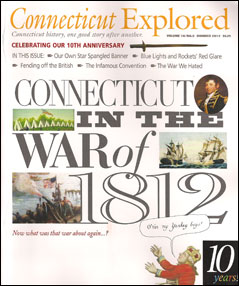(c) Connecticut Explored Inc. Summer 2012
Subscribe/Buy the Issue!
Anniversaries provide a wonderful impetus for refreshing our understanding of big moments in history. Last year’s kick-off of the 150th anniversary of the Civil War, the celebration of Harriet Beecher Stowe’s 200th birthday, and the commemoration of the 10th anniversary of the terrorist attacks of September 11, 2001 gave us opportunities to delve deeper into Connecticut’s role in each event—roles that we could be proud of.
Now comes the 200th anniversary of the War of 1812, which this issue explores. Very much in need of a refresher, the first question I asked myself was, “Now, what was that war about again, and what did it have to do with Connecticut?” That led to my second question, “Uhhh, is it something to celebrate?” Ask our friends in New London and Stonington and the answer is “Yes!” Ask Wesleyan University Emeritus Professor of History Richard Buel and the answer is a decisive “No!”
That’s when I got intrigued.
As you’ll read in State Historian Walt Woodward’s column, Connecticut’s attitude toward the war was defiant to say the least. The problem is, we fought against not only the British but our own federal government. We refused to enforce federal law. We refused to provide troops when the government requested them. Connecticut Federalists obstructed the exercise of federal authority and seriously discussed secession—secession! As Dr. Buel wrote in an e-mail to CT Explored team member Mary Donohue, “Do you really want to feature this sort of behavior?”
The New London community, however, sees things a little differently. Edward Baker, executive director of the New London County Historical Society noted, also in an e-mail, that “The people of Connecticut—all of Connecticut—were affected by the War of 1812, mostly through a lack of markets and lack of manufactured goods caused by the British blockade of American ports. The people of southeastern Connecticut (at the time the most densely populated part of the state) were terrorized by the visible and active presence of the enemy just off shore; and at Stonington, we had one of the few successes of American militia in the war—that’s something to celebrate. End result, the War of 1812 was a boon to Connecticut. It created homegrown manufacturing due to limited access to English goods during the war. Where would Connecticut be without that? And it established—once and for all—the concept of ‘freedom of the seas,’ allowing Connecticut to expand, particularly its whaling industry. The industrial revolution could not have happened without a lubricant like sperm oil.”
In this issue we’re exploring Connecticut’s behavior, good, bad, and indifferent. Matt Warshauer explains what that talk of secession was all about, Nancy Steenburg recounts the bravery at Stonington Point, and Jerry Roberts tells of the events in Essex that are still annually commemorated with the “Burning the Ships Parade”—at one time known as the “Losers’ Day Parade.” Our photo essay features artifacts from the war that are on view this summer in a special exhibition at the Lyman Allyn Art Museum in New London—including Stonington’s unusual 16-star, 16-stripe battle flag that some call the Star Spangled Banner’s little sister (see our related story).
Read on and decide for yourself. Was this Connecticut’s finest hour? To me, a clear-cut yes or no is not as important as a more nuanced understanding that our nation was then still young—and Connecticut was defiant but also fiercely independent, self-interested, and perhaps a little big for its britches.
Explore!
Read all of the stories in the Summer 2012 issue
Really of our stories about Connecticut at War on our TOPICS page

